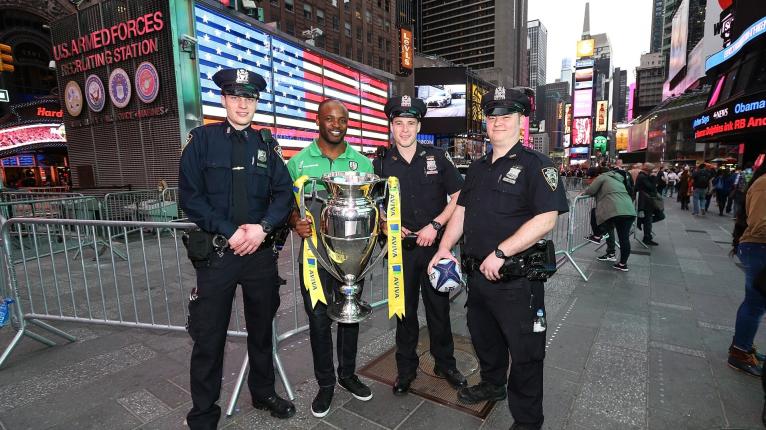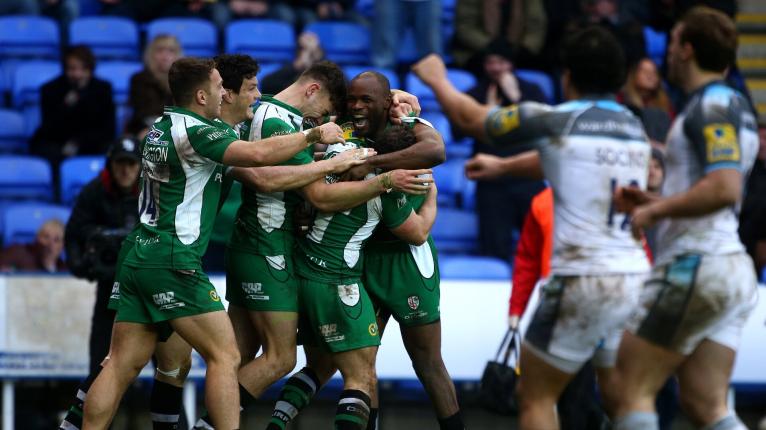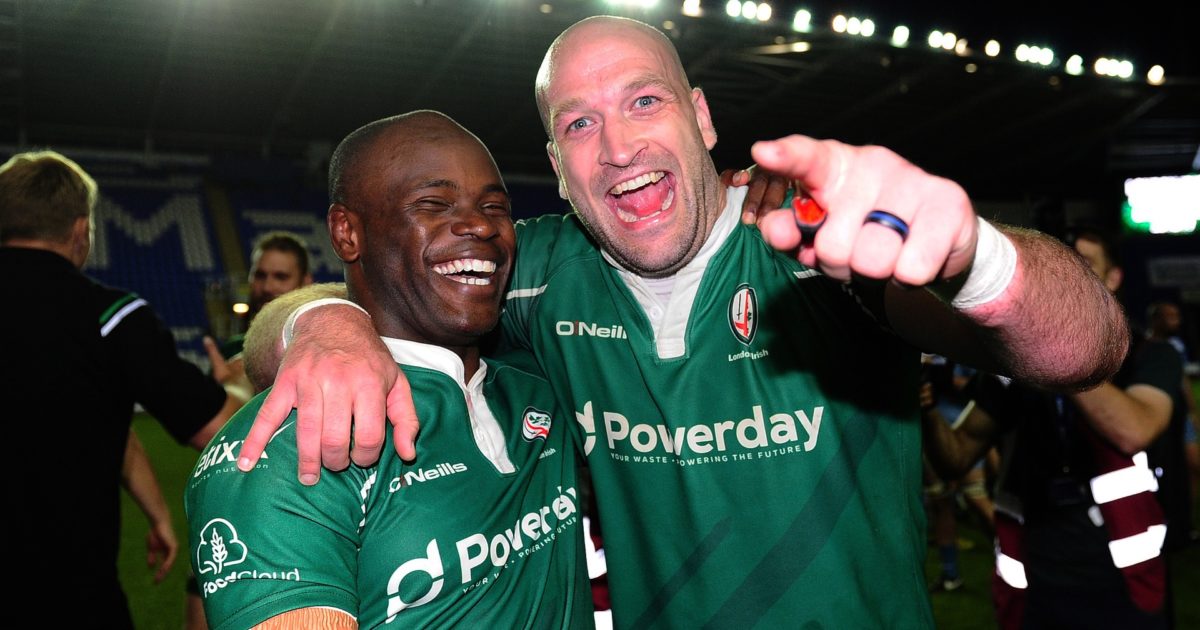'I've heard stories of players literally having contracts taken off the table overnight… I really feel for those guys'

Saturday was the strangest of strange London Irish farewells for Topsy Ojo. Instead of being at the Mad Stad to help the Exiles bid a colourful adieu to their 20-year-old rented Berkshire home before they switch back to the capital, the lockdown played spoilsport.
Not since a March 1 defeat to Wasps have Irish hunkered down collectively in Reading, the pandemic restrictions leaving club legends such as Ojo making do with a 20-plus person video call uploaded on social media at the same time the Exiles were originally slated to kick-off versus Bristol Bears in their final ever Madejski Stadium fixture.
The cancelled goodbye was like a bad pint of Guinness for the club that is all about the craic. Irish had played 299 games at their adopted home, winning 179 and at times generating enormous footfall compared to their Premiership origins at the long lamented, limited capacity Avenue in south-west London.
For instance, a crowd of 23,790 packed in for a St Patrick’s party in March 2008 around the time when the club was giddily going places, reaching a Heineken European Cup semi-final the following month and then progressing to the 2009 Premiership final.
Recently, though, the blarney has gone stale, Irish’s yo-yo existence between the top-flight and the Championship taking its toll on support and convincing owner Mick Crossan that the £6.56m loss recorded in 2017 and 2018 would be best tackled by starting all over again at the new Brentford Stadium, less than ten miles from their old spiritual Avenue home and their current Hazelwood training centre.
As a new ground ambassador, Ojo has nothing but positive things to say about the hopefully bright future that lies ahead for London Irish. Still, closing the final chapter on Reading in such weird circumstances wasn’t without its emotions, even for a player who called time on his stellar career a year ago after Irish secured their latest promotion back from the second-tier.
“It would be brilliant to get a farewell fixture there,” said Ojo to RugbyPass about a ground that was home turf for his entire London Irish career. “You have to deal with what is happening at the moment but having been there for 20 years, to be able to have one last farewell game would be nice.
“Bristol would have been a huge farewell party, but if there is an opportunity to do something I’m sure the club will. It would be nice to say goodbye to a home that has looked after us for the last 20 years.
“For me, Reading was brilliant. It will always hold a special place for me – it was where I started, where all of my fondest memories for London Irish happened. I understand the club needs to move forward and needs to change its future path but in terms of Reading, you speak to a lot of the players who have come and gone and been there, it was a special place and a lot of people have really fond memories.
“When that place was packed and the atmosphere buzzing, it was a really, really good place to play, a lot of fond memories. The one that stands out is we played Munster in the Heineken Cup. Evening kick-off, quite foggy, 23,000 Irish fans in there whether they were in green or in red. They were all full of noise and it was a Test match pretty much.
“The intensity, the speed of it all, it was just an unbelievable game. That one stands out. I know we had a big win against Perpignan the year we made our run to the semi-final, which was brilliant, but that Munster game was the one that stands out in the big, big games I had at the Madejski.”
Having grown up in Kent it was the 2002 Powergen Cup final at Twickenham when Ojo first saw London Irish in the flesh. Four years later he was starting in his first Premiership match, a January 2006 Mad Stad humdinger versus Leicester in front of 11,000, and the curtain then fell on his career in April last year, just over 5,000 in attendance for the promotion party and a win over Ealing.
In all that while, his routine was the same. Arrive 90 minutes before kick-off, warm-up on the pitch with 30 minutes to go to the first whistle and a regular diet of whatever his favourite tunes happened to be. “My routine was quite relaxed. I know some guys really liked to go through a long process but I hoped during the week I had pretty much everything sorted so the game day was just about going through things in my mind.”
https://www.instagram.com/p/CBGfauZgzaU/?igshid=wg7oz0uv8rh1
The curiosity is why the Irish challenge petered out this past decade. They had briefly evolved into an English powerhouse, battling it out at the business end for trophies and enjoying average home attendances of 15,000 the season they were agonisingly pipped at the post in the league decider by Leicester. “It’s hard to say,” shrugged Ojo, struggling to lay the blame on one specific reason for the downturn in London Irish fortunes.
“There was definitely a transition. What made us successful was we had that good blend of young talent coming through, a good core of experienced internationals, experienced foreign players as well and the whole thing just gelled for a purple patch of a few years. We nearly reached the summit.
“We then lost a few players. The Armitage brothers left, (Seilala) Mapusua left, Bob Casey retired, players like that, and if the succession can’t quite keep up the momentum then ultimately there is going to be a dip. We didn’t quite get that balance right.
“We lost too many players of that quality, that stature and didn’t really have the succession plans to maintain it. As a result, performances started to dip, we didn’t do as well which probably led to a decrease in fans coming to the stadium and once you start yo-yoing it does become quite hard.”

There is renewed hope now, though. Declan Kidney’s recent stewardship, allied to the prospect of a more equitable financial groundshare with Brentford, has Ojo believing the curve is again heading upwards at a club that will hope social distancing measures and restrictions on large gatherings won’t stall ambitious plans to regenerate London roots once the new ground opens in September.
“There’s a clear plan with Declan being there now. With the way the squad has played this season, you would like to think we are on an upward trend and looking to really build. It’s almost like a restart… you’re trying to get that (old) blend back together and into that excitement of playing in a new stadium with a new fanbase and trying to rebuild something really special. Hopefully, you have got the makings of something that can be successful in the future.
“Having driven past the stadium many times, it looks class. It’s going to be really, really good and is something we probably needed for a while, something that is more of our own – we own more of it so we will be able to generate more, put more back into the club. We talking about sustained success.
📊 | Some of the key moments from over the years 🗓
It's been an incredible journey, thank you to everyone who has made the last 20 years so special.
Here's to the next chapter ☘️#FarewellMadejski pic.twitter.com/ug5U16V14c
— London Irish (@londonirish) June 6, 2020
“You can get to the stadium door-to-door on a good day in 15 minutes, training ground to the stadium, and then in terms of access, there are plenty of train stations within a mile coming from central London and from out west. There is almost no excuse not to get there. Just leave the car at home, come and have a brilliant day at the stadium and create a brilliant atmosphere.”
Capped twice by England in 2008, Ojo counts himself very lucky he called time on his career at the age of 33 and wasn’t tempted to go for one final spin with London Irish in this season’s now suspended Premiership. If he was still playing he imagines he would be fretting over a likely June 30 expiry of any deal he would have had and trying to line up alternative employment amid a pandemic would have been a minefield.
“I really feel for guys who are out of contract, who are in that situation at the moment because if you’re talking retirement or even moving clubs, this is something that you want to plan, something that you want to have sorted so that you know you have got a job or know which way your future is going to go.

“I’ve heard stories of players literally having contracts taken off the table overnight as this thing [the pandemic] happened and a lot of guys now are out of contract at the end of June. They have had positive conversations but nothing is guaranteed until there is a very clear path back for rugby.
“As it stands a lot of guys on June 30 are going to be unemployed. When you have got bills to pay, you’ve got mortgages, rents, you might have a family to feed, you were working and planning and all of a sudden that is gone, it is really, really tough. I really feel for those guys,” he said, explaining how a variety of things – coaching various sports at a Leatherhead school four days a week, coaching twice weekly with the London Irish Wild Geese, becoming a club ambassador and doing media punditry – made his transition from player to former player much smoother.
“There is definitely an adjustment period and in the build-up, I spoke to quite a lot of people about how they had found it. The timing just working out in that there was a lot of opportunities for me to transition as smoothly as possible.
https://www.instagram.com/p/B8HewOUA7IF/
“Initially I was nervous because it is always an unknown. You’re not ever going to replace the buzz of being out there on a pitch in professional rugby, but what you can do if you’re lucky is find something that can replicate it and you still get similar feelings. I’m spinning a few different plates but it’s all stuff I really enjoy and I knew I would.
“I knew definitely in coaching that there were going to be similarities. You go through very similar emotions on the touchline and I’m looking towards becoming a qualified mentor and helping in that regard, preparing people for the ups and downs and the emotional side of things. Then there’s the media side as well, I’m pitch-side commentating, in the crowd trying to convey the atmosphere at games, so you’re almost tapping into a very similar feeling as well.
“This situation now is very weird but reflecting on this first year, it feels so lucky how it worked out because for a lot of people they don’t get it to work out that way. It’s a lot bumpier and with the situation now it [retirement] is going to be forced on a lot of players which is unfortunate.”





























